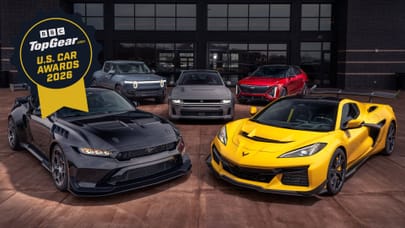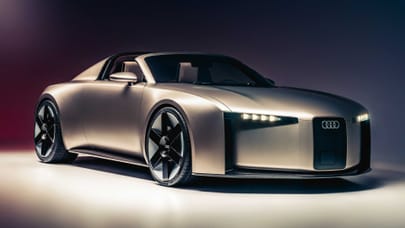
Jeremy Clarkson on the fuel crisis
And so, Porsche has turbocharged the new 911, Ferrari has introduced an 800bhp Enzo, Aston is beavering away with its new DBS and, imminently, Mercedes is expected to announce plans for a new collaboration with McLaren.
The message is clear. As fast as politicians wrap the motor industry up with noise, emission and safety red tape, car designers are unravelling the constraints with more and more power.
No really. We already have a 240bhp Golf. That’s twice as much as we were given 20 years ago and if that rate of change keeps going, people learning to drive today will finish their career in a family hatchback with 1,000bhp under the bonnet. Nice.
We’ve already got family saloons with 500bhp to play with. That’s 100 more than Jackie Stewart had when he won the F1 Championship in 1973. What’s more, Mitsubishi can sell you a car that develops 200bhp per litre. And it’s only 20 years since Daihatsu became the first car maker to sell a car with half that. We’re on a roll boys. And I’m loving it.
However, some say this is nothing more than a last hurrah before the oil runs out, that the engineers are having one last party with their outdated 19th-century toy box before they’re forced by circumstance to put down their petrol and pick up some potato peelings instead.
The most recent scare story suggests that the world’s supply of oil, gas and coal will be exhausted in about 30 years’ time. And if that’s true, then there’s no doubt the big car makers are being completely irresponsible. Gorging on the fat of the land now, when they know full well a famine is just around the corner. Only an imbecile would do that.
There’s plenty of evidence to suggest it is true. At present, people in the Third World use around half a gigajoule of energy a year, compared to the average American, who gets through 300 gigajoules. And 40 burgers. But as we keep being told, it’s not the ‘Third World’ any more. It’s the ‘developing world’, and that’s where the problems lie.
If China and India increase their consumption to just a tenth of the US average, they could suck Arabia dry in about 15 minutes. This would plunge the world into the Dark Ages. Or worse. Sociologists tell us that when the oil starts to go, nation will fight nation for the last few drops, and the social order will disintegrate.
They may have a point. When we had that trivial fuel shortage 18 months ago, people formed disorderly queues outside garages, waiting with fists clenched and blood vessels fit to burst as the chap in front filled his tank, and then his washer bottle, and then his trousers pockets with petrol.
Top Gear
Newsletter
Thank you for subscribing to our newsletter. Look out for your regular round-up of news, reviews and offers in your inbox.
Get all the latest news, reviews and exclusives, direct to your inbox.
Imagine that on a global scale. Imagine if there were no trucks to deliver food to the supermarket and you knew that your neighbour had 300 tins of baked beans stashed away in his basement. Would you watch your children starve or would you pop round and shoot him in the face?
Same goes with power. You’ll have your nose pressed to the gates at Sellafield begging for a cup of electricity to run your kid’s iron lung. But they won’t be able to help because, back in 2005, all the eco-mentalists told them that nuclear energy wasn’t green.
Eventually, when every candle had been burned, and every tin of baked beans consumed, we’d be back in 1550, using beads to buy chickens. And dying three times a day from diphtheria and rabies. Death, famine and disease all topped off with a light sprinkling of nuclear holocaust. And it’s all Porsche’s fault for turbocharging the 911.
Unfortunately, the people who tell us these things tend to be card-carrying lunatics, with an agenda. They’re the ones who were chained to the fence outside Greenham Common, saying that atomic war with Russia was inevitable, and that if the Earth’s climate changes – something it has done constantly since the dawn of time – we’ll all drown.
They’re the ones who see only bad in the world. The ones who lie in fields of gold on glorious summer days, complaining about the distant hum of traffic, the ones who see a corporate conspiracy at the bottom of every packet of crisps.
Life has usually dealt them a handful of low clubs and diamonds. How many good-looking women did you see at Greenham? And because everything turned out so badly, they want to change the system. That’s why they want us to cycle to work and adopt a fox – because it brings us down to their level, not because the oil’s running out. Because it isn’t.
In the 1920s, Germany developed a system for extracting oil from coal. In the war, (which we won, by the way) it was used to propel tanks and trucks. In Brazil, they run cars on oil from chrysanthemums. And I used to power my old Land Cruiser on chip fat.
But all this is by the by because, with a barrel of conventional oil costing around $35, it is now economically viable to go after unconventional oil. The black gold that’s held in sand, for instance, under Canada. How long will this last? Well, according to scientists, centuries.
Even if half of China decides that it wants to go to work every day in a Jet Ranger, and India becomes the biggest market in the world for Lamborghini Diablos, Neil Young and Donald Sutherland will provide the juice to keep them going.
Oh, and don’t worry about the carbon dioxide, either because, apparently, this can now be extracted from coal gasification plants and then pumped deep into the earth, where it increases pressure forcing more oil and gas to the surface. Brilliant. The eco-mentalists will have to go and worry about something else. Horses, perhaps.
In fact, don’t worry about anything because, when the chips are down, man always finds a way. With no power tools at all, we survived the last ice age. Without the benefit of aspirin, we came through the great plague. And since then we’ve conquered space and developed the Rice Krispie.
You think bird flu’s going to wipe us out? Well, I wouldn’t count on it because somewhere, right now, a nerd with a white coat and pipette is figuring out how it can be beaten. And it’ll be another nerd, a few centuries from now, who finds a way to power cars using the sun’s ultraviolet light.
And when the sun runs out, we’ll get on a space ship and go somewhere else. Or build another one.
The message, then, really is clear. If you want a 911 turbo, and I must say it does look rather good, buy one. In fact, you can buy whatever car you want. Not an Audi Q7, though. I drove one in Norway recently, and it seemed to be rubbish. And a rubbish car is, I’m afraid, is a waste of petrol.
Trending this week
- Car Review
BMW 1 Series








